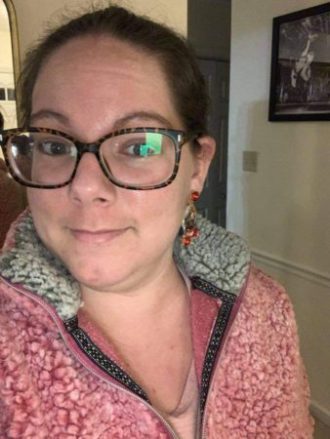By Liora Engel-Smith, North Carolina Health News
Alyssa McCord would rather not see a doctor at all. The upstate New York native who now lives in Jacksonville with her husband and daughter attributes some of her reluctance to upbringing. Her parents only went to the doctor when absolutely necessary, she said.
The other part of that reluctance, says the 38 year old, is how providers react to her weight.
McCord, who wears size 20 pants, is used to providers making demeaning comments about her body. Often, they’d blame her weight for every ailment — from heavy periods to colds to numbness and tingling in her hands.
In September, McCord had an experience that surprised even her. She’d gone to a family doctor to discuss consistently heavy periods and constant exhaustion. The doctor said her stomach was cramping because she is fat. If she lost weight, he told her, the pain would go away.
The doctor did not order any of the customary tests, such as abdominal ultrasound or blood tests to confirm his assertion. He looked at her and made up his mind, McCord said.
McCord would later learn from another provider that an enlarged uterus caused the cramps and heavy bleeding. Blood loss from the heavy periods made her anemic, accounting for her fatigue.
Nearly every person in a bigger body has their own story of weight-based bias at the doctor’s office. It could be anything: a too-small blood pressure cuff or medical gown, a wince from a triage nurse during a weigh-in, a negative comment from a physician, or as in McCord’s case, blaming every symptom on weight.
It’s impossible to know exactly how pervasive weight bias is in the health care system, especially because it involves provider attitudes, but it’s safe to say that fat discrimination is rather common, said Ya-Ke “Grace” Wu, assistant professor at the UNC Chapel Hill’s school of nursing.
Current estimates are that 19 to 24 percent of obese adults experience some form of discrimination because of their weight, from bullying at home or work to fat discrimination in clinical settings. The rates of weight bias are even higher in women and people with higher body mass index scores.


Wu, who studies weight discrimination, said the maltreatment can also be nonverbal, from flimsy chairs that cannot accommodate larger bodies in the clinic waiting rooms to weighing them in hallways, rather than in a room that offers some privacy from passers-by.
No matter how the bias is delivered, the message is clear to any person in a big body: Weight isn’t just a number, it’s a moral failing and a cause for shame.
These negative attitudes from providers have far-reaching health implications, Wu said. Some fat people may avoid the doctor altogether, delaying diagnosis of conditions such as diabetes, high blood pressure, or more serious conditions, such as cancer. Sense of shame about body size can also lead to a host of mental illnesses, from depression to anxiety to suicidal thoughts. It’s even correlated with weight gain and binge eating disorder, a condition that involves cycles of compulsive and restrictive eating.
“The ‘fat is bad’ lense kind of corrupts everything,” said Lindo Bacon, author, researcher and a member of the Health at Every Size movement, a grassroots effort to eliminate weight stigma in all areas of society. “And at this point, it just seems like it’s basic good health care or so it seems to the doctors, that everybody’s supposed to get thinner.”
Negative treatment, negative outcomes
Weight stigma isn’t just about hurt feelings, it is also linked to higher mortality rates, in part because discrimination often leads to unhealthy behaviors, such as exercise avoidance, overeating and substance use. The stress of weight stigma is associated with metabolic changes that can make people sicker, including higher levels of the stress hormone cortisol and inflammation markers.
Evidence of harm is so robust that last spring, a panel of experts from universities and health care systems all over the globe published a call to end weight stigma in all areas of life in the prestigious journal Nature Medicine.
“Weight bias and stigma can result in discrimination, and undermine human rights, social rights, and the health of afflicted individuals,” the authors wrote.
As obesity rates in adults continue to rise, the public health consequences of fat discrimination could be significant. In North Carolina, for example, adult obesity rates more than doubled between 1990 and 2019.
While the scientific community has established that weight alone is not a predictor for health, societal understanding of obesity continues to lag. Many people, including health care providers, believe that diet and exercise are the only ways to manage obesity, despite evidence to the contrary.
Public health experts have known for years that obesity is a multifactorial condition, affected not only by behaviors but by the social determinants of health, including income, access to healthy food and neighborhoods that may discourage walking, to name a few. The focus on diet and exercise alone assumes that obesity is always within a person’s control, said Bacon, the Health at Every Size advocate.
“From a global perspective, we know that it’s the social determinants of health that play a much larger role [in obesity],” Bacon said. “ … So even our messages of bringing it down to individual behavior, are ignoring the really big issues in health, which is about inequity.”
Weight and nothing else
Rashelle Hamilton was used to providers taking her seriously. Hamilton, who had always been trim, had gained 30 pounds after the birth of her youngest daughter, Violet. She thought her birth control implant may be at fault.
Hamilton, who weighed 218 pounds late last year after the birth, was surprised to find that her new weight affected the quality of care she received.
“Before they would mostly believe me when I said I had a problem,” the Cary resident said. “They believed me and listened to my symptoms and then went off of my symptoms.”
But at an annual physical last December — her first in a larger body — the doctor looked at her and determined that she had Type 2 diabetes without a blood test or a review of diabetes symptoms, Hamilton said. The physician immediately prescribed Hamilton an $800-a week diabetes injection and then ordered tests to confirm what she thought was the correct diagnosis.
Hamilton didn’t have diabetes, the blood tests later showed. The experience left her with a sense that she cannot trust medical providers. At the recommendation of a friend, Hamilton found a different doctor to go to. But the December physical cost her time, money and aggravation.
Wu, the UNC researcher, said that many overweight and obese people take the same route, moving from doctor to doctor until they find someone who would listen. But that approach can still cause damage, because of delayed diagnoses.
“Some diseases have a golden window for treatment,” Wu said. “And so if you delay the treatment, you may delay the whole improvement [trajectory] of the disease.”
The economic impact of repeated appointments for the same complaint is unknown, Wu said, but with rising health care costs and the lack of provider availability in rural areas, patients may not have the money or ability to find a provider who would listen.
Health without weight?
If you walk into Aimee Feste’s clinic in Asheville, odds are, the word “weight” won’t come up unless you say it. Feste, a body-positive nurse midwife with the Asheville-based Mountain Area Health Education Center, says she first learned about the weight discrimination from her patients.
“People can be healthy in a larger body size,” she said. “I say to my own patients who are worried about their weight ‘I could cut off your arm and you would lose 10 pounds and you can be a whole heck of a lot less healthy.’”
Feste says very few conditions, such as water retention during eclampsia, require in-office weight measurement. Instead, Feste focuses on the patient’s life as a whole, even when patients have chronic diseases, such as diabetes, that would traditionally trigger a discussion about weight.
She might talk to diabetic patients about their stress levels, their sleep, their ability to get medication and access food that nourishes them. That approach may take more conversation, Feste added, but it’s far kinder and respectful to patients who are already ashamed about their bodies.
Wu agrees with that approach. A provider is in a position of power, she said, and their job is to build trust with patients.
“We don’t have to push patients to talk about weight, we should just focus on whatever health issue they come in [with] for that day’s appointment,” Wu added. “If the patient wants to talk about weight, then we can talk about it, but I always suggest that the patient lead that conversation.”
Feste said that rather than bringing up weight to patients with larger bodies, providers should educate themselves on approaching all patients, regardless of size, kindly and without judgment.
“The more we shine light on it, the more it’s talked about, the more it’s going to be an open conversation,” she said.
This article first appeared on North Carolina Health News and is republished here under a Creative Commons license. North Carolina Health News is an independent, non-partisan, not-for-profit, statewide news organization dedicated to covering all things health care in North Carolina. Visit NCHN at northcarolinahealthnews.org





There is SO MUCH WRONG about this article, about how it promotes denial and political correctness.
Enjoy feeling good about yourself now, because it will be too late when your clogged arteries, collapsing peripheral circulation, and diabetes lead to IRREVERSABLE heart and kidney failure, loss of sensation, poor wound healing and the inability to get out of bed.
But at least your FEELINGS weren’t hurt by an “uncaring” physician or nurse trying to educate you and promote healthy change.
I find it funny how similar the attitudes of these “obesity justice warriors” are to Donald Trump and the COVID-19 pandemic: Let’s just ignore the problem and it will go away on its’ own.
A good article on the pros and cons of “overweight” is here: https://www.theatlantic.com/health/archive/2017/08/is-fat-bad/536652/
Of course its in vogue to pretend otherwise, but fat takes a serious toll as well.
I had the experience of a doctor in the hospital who put me on a diet in the hospital and when I proceeded to gain weight on 900 calories a day he said “someone must be bringing you extra food!” even though I had had no visitors during my entire hospital stay.
The comments of others here seem to show they have not actually read the article. Doctors claiming you have diabetes and then prescribing insulin, with no bloodwork to back up this opinion is MALPRACTICE.
Most people who are overweight have done every diet out there, and still are overweight despite careful weighing and measuring of food. We know our weight is not good for our overall health, but when even doctors can not figure out why we gain weight on a 900 calorie diet…..you need to stop blaming us for our overweight.
When I was younger and not overweight and saw people who were fat, I told myself I would NEVER become like those people.
Well, here I am and I am now one of those people who are fat. AND IT IS NOT MY FAULT, SO STOP HARASSING ME FOR GOODNESS SAKE!
One day it may become your turn to gain weight and be unable to do anything about it. Hope and pray it never happens to you.